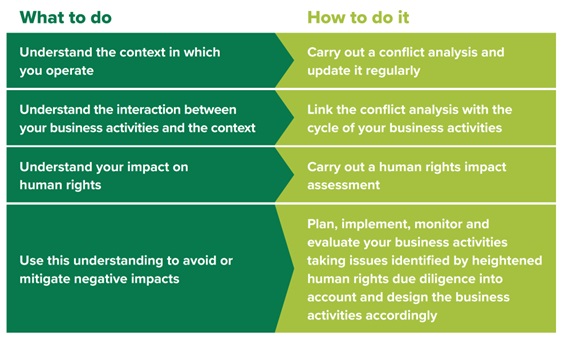- within International Law topic(s)
As 2,500 international stakeholders from national governments, international organizations, businesses, trade unions, civil society, lawyers, local communities, and academia gathered at the recent 11th UN Forum on Business and Human Rights (UNBHR Forum), one message was clear: Business and Human Rights expectations and obligations are on the rise. These expectations and obligations, based at their core on the UN Guiding Principles on Business and Human Rights (UNGPs), are now increasingly being integrated into non-binding local business expectations as well as binding international, national, and regional laws. Companies that take a proactive approach to human rights now will be best placed to manage the human rights regulatory developments that are on the horizon.
This client alert underscores three themes from the 2022 UNBHR Forum: 1) the accelerated implementation of the UNGPs through international, national, and regional actions; 2) the link between human rights and the environment; and 3) the importance of considered business decision-making in conflict situations.
1. Accelerated implementation of the UNGPs
The UNGPs have taken root in a variety of ways. Since 2013, 28 countries have launched National Action Plans (NAPs), which set forth voluntary steps to incorporate human rights into business practices. Another 18 are in development, while three countries that do not have business and human rights-specific plans have at least addressed the topic in their broader human rights plans. Against this backdrop, the UNGPs are now starting to progress from non-binding "soft law" to binding "hard law." The nature of the obligations such laws impose is also evolving - from earlier laws, which focused on reporting about human rights (e.g., California, Australia, and the United Kingdom) and ESG (e.g., India, Kenya, Japan, and Thailand), to newer action towards mandatory human rights due diligence requirements at the international, regional, and national levels:
- International: Negotiations towards a binding international agreement implementing the UNGPs began in 2014 with the establishment of a UN intergovernmental working group for this purpose. The latest round of negotiations occurred in October 2022. Negotiations continue to progress, but an agreement is unlikely to come to fruition in the short term. Activity on the domestic and regional front is more immediate.
- Regional: As set out in more detail in our
earlier Client Alert, Human Rights in Supply Chains: How New Laws in
Europe and the UK Impact Companies Around the World, in
February 2022, the EU proposed a directive on Corporate
Sustainability Due Diligence, which would impose obligations on
companies to identify, bring to an end, prevent, mitigate, and
account for negative human rights and environmental impacts in
their own operations, amongst their subsidiaries and throughout
their full value chains (the EU Directive).
The European Council finalized its negotiating position on the EU Directive in December 2022, which will facilitate engagement with the European Parliament to pass it into law. Commenting on the development of the EU Directive at the UNBHR Forum, Lara Wolters, a member of the European Parliament who has spearheaded the effort, said that while the EU is grappling with questions such as how far down the value chain the due diligence requirements will apply and whether the directive will apply to small and medium-sized entities, she hopes that the EU will agree on the proposed legislation by the end of 2023 and implement it by 2025. - National Requirements: France (2017), Germany (2021), Norway (2021), and Switzerland (2021) have implemented mandatory
human rights reporting and due diligence requirements at the
national level, and proposed legislation in the Netherlands, Belgium, Austria, and Mexico would do the same.
- For example, the French Duty of Vigilance Law requires certain companies to create and publish a "vigilance plan" to identify human rights and environmental risks and adopt measures to prevent or mitigate those risks. Companies must discuss the implementation of their vigilance plan in annual management reports.
- The German Supply Chain Act requires certain companies to identify human rights and environmental risks in their activities and supply chains, prevent or mitigate harms, and establish a complaint mechanism. This Act will apply to companies with more than 3,000 employees in January 2023 and more than 1,000 employees in 2024.
Companies that fail to comply with these laws will be subject to
monetary and other penalties imposed by public regulators or
courts. The French law, and the proposed Austrian and Belgian laws
also provide for civil liability with obligations to compensate for
harm that due diligence could have avoided.
Separately, the US has addressed supply chain due diligence through
import related requirements. For example, the
Uyghur Forced Labor Prevention Act broadly prohibits the
importation of goods into the United States from China's
Xinjiang Uyghur Autonomous Region, requiring companies to
scrutinize their supply chains to ensure that they do not contain
Xinjiang forced labor (see Jenner & Block's alert on UFLPA implementation). The EU is also
looking to address supply chain due diligence through import
related requirements (see Jenner & Block's alert on the EU's Proposed Ban on Products
Made with Forced Labour).
Although the UNGPs provide the foundation for these various business and human rights initiatives, global companies will need to consider the differing scope and application of existing and proposed laws in each of the countries in which they operate when developing human rights compliance systems, particularly given the lack of a binding unifying international legal framework. Since these initiatives have the UNGPs at their roots, however, compliance with the UNGPs nevertheless should serve as the foundation for compliance under each of these national frameworks. For further information on how to implement a human rights due diligence program, see our article in Corporate Counsel Magazine: Six Best Practices in Corporate Human Rights and Social Responsibility.
2. Human rights and the environment
The link between human rights and the environment and vice versa was another theme at this year's UNBHR forum. Specifically, discussion underscored how environmental protection is key to the enjoyment of human rights and the exercise of human rights is important for effective environmental protection, as reflected recently through a number of environment-related developments in human rights-related fora.
- In July 2022, in recognition of the link between human rights and the environment, the UN General Assembly adopted a historic resolution declaring access to a clean, healthy and sustainable environment, a universal human right.
- This followed the June 2022 UN appointment of the first Special Rapporteur on environmental defenders under the UNECE Convention on Access to Information, Public Participation in Decision-Making and Access to Justice in Environmental Matters (Aarhus Convention), who is tasked with the protection of environmental defenders who are experiencing or at imminent threat of penalization, persecution, or harassment.
- Additionally, in April 2021, the Regional Agreement on Access to Information, Public Participation and Justice in Environmental Matters in Latin America and the Caribbean (the Escazú Agreement), which aims to guarantee the right of access to environmental information and public participation in the environmental decision-making process, came into force. The Agreement requires State Parties to, among other things, implement the agreement via domestic legislative, regulatory, and administrative measures, recognize and protect people and organizations that promote environmental protection, and establish one or more impartial entities to monitor, report on, and guarantee the right of access to corporate environmental information. Redress may include restitution, compensation to claimants for harm, and measures to mitigate adverse environmental impacts, among other things. This combination of potential access to private sector environmental information (such as permits) and the establishment of forms of redress may incentivize companies that contribute to environmental harm to change their behavior.
- Likewise, the proposed EU Directive currently requires companies to address their environmental impacts alongside their human rights impacts as part of their due diligence processes.
It is therefore advisable for businesses to look at their environmental and human rights programs holistically rather than in silos. Businesses that have already developed a compliance program or strategy in relation to one area can leverage their learnings to benefit the other.
3. Human rights and conflict
International conflicts, including Russia's illegal war on Ukraine, the coup and subsequent military dictatorship in Myanmar, serious human rights violations in Xinjiang, and crises in Syria, Afghanistan, and beyond, formed the backdrop of this year's UNBHR Forum, shaping the focus of discussion at the event. While governments have responded to these conflicts with various instruments of foreign policy, such as the imposition of sanctions and provision of foreign assistance, businesses rely on different tools to promote their values and protect human rights in such challenging contexts, while also complying with an increasingly complicated government regulatory landscape.
To steer businesses grappling with the myriad of human rights and other challenges in these conflict environments, in June 2022, the UN Development Program (UNDP) issued a Guide on Heightened Human Rights Due Diligence for Business in Conflict-Affected Contexts. As the UNDP Guide highlights, business activities in conflict-affected areas are not neutral, whether the decision is to engage in business or to leave the country. As such, advanced and continuous human rights-centered planning is key in such environments, as this chart from p. 11 of the Guide explains:

While this chart is targeted at conflict environments, it provides a useful framework for businesses to consider as they begin or grow their human rights processes, implement new human rights legal standards, and expand their human rights lens to encompass environmental considerations and conflict environments.
Jenner & Block's international human rights team is available to help companies navigate these complex and evolving business and human rights challenges.
The content of this article is intended to provide a general guide to the subject matter. Specialist advice should be sought about your specific circumstances.



